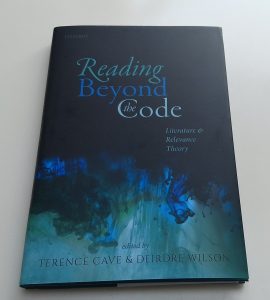* Paul Seli, Michael J. Kane, Jonathan Smallwood, Daniel L. Schacter, David Maillet, Jonathan W. Schooler, and Daniel Smile, ‘Mind-Wandering as a Natural Kind: A Family-Resemblances View’, Trends in Cognitive Sciences, 22 (2018), 479-90.
* Mladen Sormaza, Charlotte Murphy, Hao-ting Wang, Mark Hymers, Theodoros Karapanagiotidis, Giulia Poerio, Daniel S. Margulies, Elizabeth Jefferies, and Jonathan Smallwood, ‘Default Mode Network Can Support the Level of Detail in Experience During Active Task States’, PNAS, www.pnas.org/cgi/doi/10.1073/pnas.1721259115
Back from a summer recess to take note of two papers on mind-wandering, which has been such a favourite topic on this blog. It was the subject of my British Academy Shakespeare Lecture back in May. I recently realised that you can get the audio of that event right here. It was only bearable for me to listen to about six seconds of the talk, from which I conclude that either I or the audio sound a bit soupy, and whatever sentence I was uttering had neither shape nor sense — but that is actually quite a positive response from me, and the listening-in didn’t ruin my happy memories of the evening.
In the lecture, I say that I think that the modern science of mind-wandering has things to tell us about Shakespeare’s plays, and also that we can see in return that Shakespeare knows things about mind-wandering, and makes use of it. There will be a written version published next year, and it will definitely take account of the exciting essays cited above, which both include as author Jonathan Smallwood, who kindly spoke to me before the lecture and helped me past a few misconceptions (though he cannot be blamed for any that remain).
*
The first, by Seli et al., proposes that if we want to understand the various kinds of mental process that gather under the umbrella of ‘mind-wandering’, we should take a ‘family resemblances’ approach, which means ‘treating it as a graded, heterogeneous construct’, with a view to achieving ‘a more nuanced and precise understanding of the many varieties of mind-wandering’. This might be better than taking ‘task-unrelated thought’ as a necessary and sufficient definition, and it might be better than rigorous taxonomies that devote energy to saying what should not, as well as what should, count as mind-wandering. This all sounds very sensible to me, and it seems to fit with the emphasis on networks, interactions, and complexity in brain functions, that I keep reading about.
*
The other paper has a more concrete proposition to make, but it is also an attempt to broaden our understanding of the mind-wandering field. A group of brain regions known as the ‘default mode network’ (DMN), as has been discussed on this blog before, and in my lecture linked to above, has often been seen as crucial contributor. It has seemed to be important in ‘task-unrelated thought’, in a positive and constructive way: ‘it plays an integrative role in cognition that emerges from its location at the top of a cortical hierarchy and its relative isolation from systems directly involved in perception and action’. However, the findings discussed in this paper point towards an expanded understanding.
By combining brain-scanning and subjects’ self-reporting (of… ‘dimensions of thought that describe levels of detail, the relationship to a task, the modality of thought, and its emotional qualities’), the authors found a link between the DMN and the level of detail in on-task thought. Thus they maintain that ‘activity within the DMN encodes information associated with ongoing cognition that goes beyond whether attention is directed to the task, including detailed experiences during active task states’. So it’s important that this network isn’t only associated with the wandering mind, but then again it’s also important that this network that encodes information (and detail) is active when off-task. General detail-maintenance is an interesting item to add (with an asterisk) to the list of things associated with mind-wandering and the DMN (e.g. in the Corballis book I noted back here).
